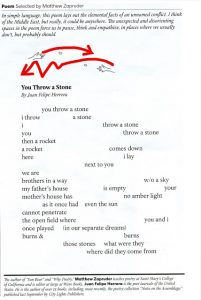Most recently in my ASTU 100 class here at the University of British Columbia, we have been investigating poetry, or more specifically, war poetry. Poetry is filled with dynamic emotion that can have a profound influence on readers with only a few simple verses. It is surprising to me how reading a few sentences in the form of poetry can have just as large of an effect on my emotion as a whole novel. It is as if the simplicity of the small articles of writing frame the potency of the mental state of the writer in such a way that it can be directly transferred to the reader.
All the poetry we have reviewed in class I have thoroughly enjoyed, but one in particular remained in my thoughts longer than the others. This was a poem called You Throw a Stone. This poem is characterized with the lack of punctuation and random spaces between words, creating distance and confusion. It carries the emotion of a disconsolate emptiness but also of a puzzled misery. It makes the reader question our motives for war and the consequences that it brings. In the end of the poem, when both characters lie died, not representing single individuals but rather whole nations, it pays tribute to the unquestionable pain that war brings. The dead do not feel honor, those who have lost the ones they love do not feel the victory of their nation, only an emptiness; a confused misery.
When I first read the poem, I read it through the voice of a child, which was perhaps why it had such a large effect on my emotion. It reminded me of two children, unaware of the racial and geographical boundaries that separated them, being divided by forces they didn’t understand. While realizing that the humans that inhabit this earth are different, with different cultures, different beliefs and different dreams, this poem reminded me that we all have children. We all must care for our young. We all must nurture them into existence, and when they die, we all feel pain. The death of a child is perhaps one of the most terrible sorrows we can encounter, and this poem, to me, was asking what is worth the cost of this misery? Is there any benefit to war that outweighs the death of our children?

The genre of poetry to me is one of immense beauty. It brings a new and diverse vision of our society to life. The poem You Throw a Stone is not direct; to different people it can have different meanings and allow them to ponder over different questions. Although not always having a direct message, poetry is thematic and it draws our attention to new ideas and integrated emotions that the poet is trying to convey. In this way, I believe poetry is valuable in our scholarly discussion, for it does not represent facts or direct representations of history, but rather abstract ideas, philosophical questions and a pondering over our society and our behavior.
